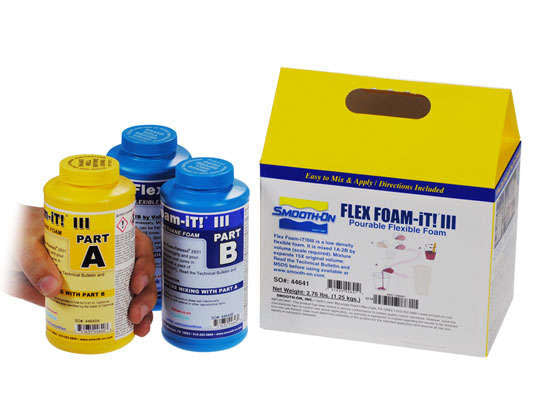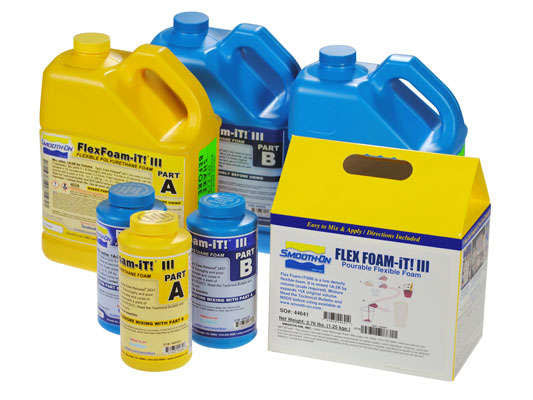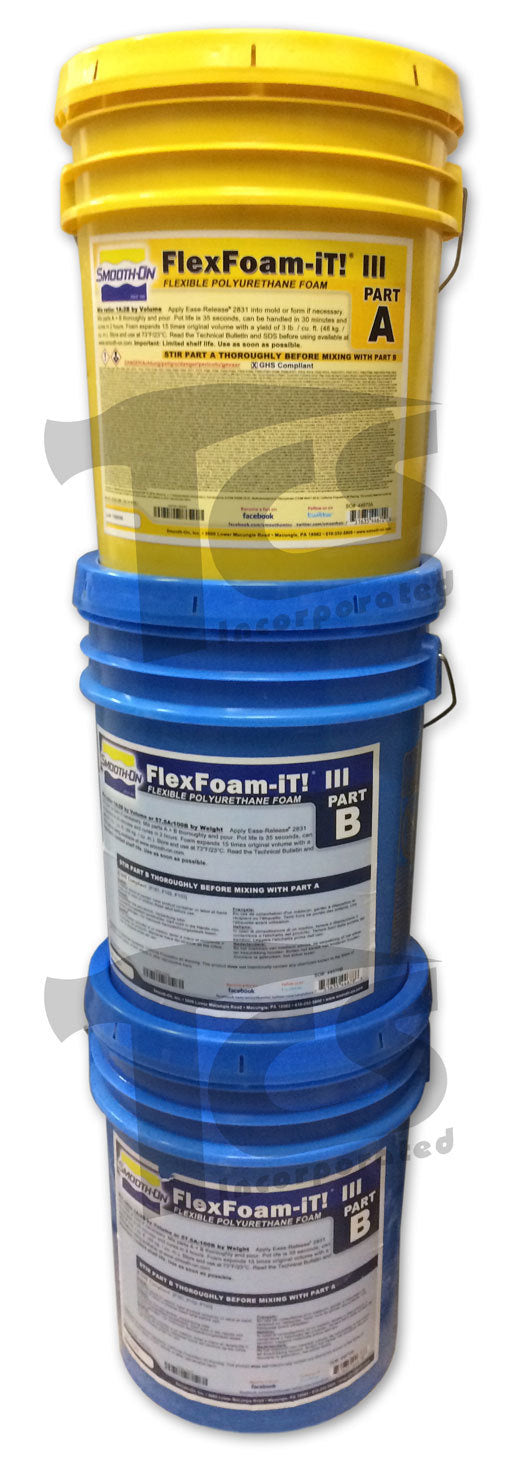Smooth-On
FlexFoam-iT!™ III
FlexFoam-iT!™ III
4 in stock
Couldn't load pickup availability
FlexFoam-iT!™ Series foams are premium quality water blown flexible foams that can be used for a variety of industrial, special effects and art & crafts and projects. With several to choose from, uses include making theatrical props (swords, knives, hammers, etc.), industrial gaskets, custom padding and cushioning, and more. SO-Strong™, UVO™ or IGNITE™ colorants can be added for color effects.

Part A and B liquids are combined, mixed and poured into a mold or other form (apply release agent if necessary). Mixture will rise and cure quickly to a solid, flexible foam. Foams vary by density and offer good physical properties. FlexFoam-iT™ III is the lowest density foam and expands the most.
KEEP OUT OF REACH OF CHILDREN
Instructions
Preparation - Store and use at room temperature (73°F/23°C). Use in a low humidity environment (below 50% RH). Mixing containers should have straight sides and a flat bottom. Mixing sticks should be flat and stiff with defined edges for scraping the sides and bottom of your mixing container. Good ventilation (room size) is essential. This product has a limited shelf life and should be used as soon as possible. Wear safety glasses, long sleeves and rubber gloves to minimize contamination risk.
Because no two applications are quite the same, a small test application to determine suitability for your project is recommended if performance of this material is in question.
Applying Release Agent - Urethane foams are adhesive and will stick / bond to many surfaces. We recommend Ease Release™ 2831 to release urethane foam from most surfaces. If the release application is particularly difficult (example; releasing urethane foam from urethane rubber), we recommend an application of Universal™ Mold Release followed by an application of Ease Release™ 2831.
WARNING: Do not use Universal™ Mold Release by itself, or any other silicone based release agents. This will collapse the foam.
IMPORTANT: To ensure thorough coverage, lightly brush the release agent with a soft brush over all surfaces. Let the release agent dry for 30 minutes.
IMPORTANT: Shelf life of product is reduced after opening. Remaining product should be used as soon as possible. Immediately replacing the lids on both containers after dispensing product will help prolong the shelf life of the unused product. XTEND-IT™ Dry Gas Blanket (available from Smooth-On) will significantly prolong the shelf life of unused liquid urethane products.
Pre-mix Parts A & B – Stir or shake both Part A & Part B thoroughly before dispensing.
Measuring – Stop! Know the mix ratio of the foam product you are using. Some are by weight and some are by volume. Dispense the correct amounts of Part A and Part B into a large mixing container.
For Best Results - Pre-Mix Part B after measuring out material – although not necessary, pre-mixing Part B using a drill and mechanical mixer (such as a turbine mixer available from Smooth-On) after measuring out and before combining with Part A will yield best results. For Best Results - Use a Mechanical Mixer – Mix for 30 seconds and pour into mold or form.
Mixing by Hand – Stir quickly and deliberately for 30 seconds. Make sure that you aggressively scrape the sides and bottom of your mixing container several times. Pour into mold or form.
Be careful not to splash low-viscosity liquid out of container. Remember, these materials cure quickly. Do not delay between mixing and pouring.
Pouring & Curing - For best results, pour your mixture in a single spot at the lowest point of the containment field and let the mixture seek its level. Allow space in the containment field for the foam to grow as it expands to its ultimate volume. Allow foam to cure for at least 30 minutes before handling.
Mass Concentration / Mold Configuration – Pouring large amounts at a time in certain mold configurations (i.e. cylinder) could cause excess heat to be generated and result in splitting (fissures). Step pouring in layers may resolve this problem.
Improving Surface Finish & Minimizing Voids With Back Pressure - Capping the mold cavity opening with a board that has predrilled holes will improve surface finish for some foams. For more information, watch the video:
Is Your Foam Collapsing? - This is a common phenomenon associated with cold temperatures, inadequate mixing or both. Environment or material too cold? Warm it up. Inadequate mixing? You must thoroughly pre-mix both parts A and B. After combining A and B, mix thoroughly. If using a mechanical mixer, mix for 30 seconds. When hand mixing, mix quickly and aggressively, almost whipping the material.
Share




- Choosing a selection results in a full page refresh.
- Opens in a new window.



